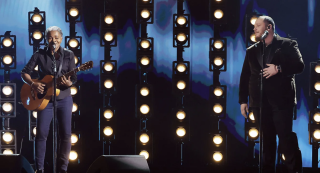Personal Perspectives
Can Music Save the World?
Personal Perspective: The Tracy Chapman and Luke Combs duet moved me to tears.
Updated February 7, 2024 Reviewed by Ray Parker

By now, you've probably seen and heard the magical Grammy Awards performance of Fast Car by Tracy Chapman and Luke Combs. As a young baby boomer, I'm about the same age as Chapman, and I had her song on repeat when it first came out—hanging on every word of this story about someone who dreamed of leaving a life of poverty and grinding family obligation. It reflected my own life. When she got to the part that said, "Someone's got to take care of him/I left school, that's what I did," I would groan out loud, "No!" That's how much this song got to me.
Fast forward some 30-plus years, and I don't think I've watched the Grammy Awards since the '80s. I don't know Dua Lipa from Duo Lingo. I tuned in Sunday evening because I heard, like many children of the 1970s, that Joni Mitchell would be performing. (Now, it's a miracle that Mitchell is not only alive but performing in public, but that's another post.) Then I heard the familiar opening notes of the song and saw deft fingers on guitar strings, and the camera panned out to reveal Chapman's beatific face, my heart leaped in recognition and joy.
But it wasn't just an exercise in nostalgia. I was utterly moved by Combs and the two artists' obvious respect and generosity toward each other. By now, you might have heard how Combs first fell in love with the song when he was 4 when his dad would play it, and how it never quite left him, so much so that he recorded it note-for-note, line-for-line, not even changing, "I worked at the market as a checkout girl." He didn't record it for profit; he did it because it spoke to his soul.
My musical tastes have encompassed different cultures at different times. As a teen, I listened—and danced to—soul and funk: Earth, Wind and Fire, Parliament, and Prince. The fact that Asian Americans gravitated toward Black music in that era has its roots in our respective social movements of the time.
They had the Black Panthers, and we had Yellow Peril, but it was all about social justice—with a funky beat. As I entered college, I leaned towards mainstream rock—The Police, Talking Heads—and discovered "classic rock," the "White" music from back in the '60s.
I'm now an Americana and, yes, a country fan, which aligns more with red America than blue. I'm aware that the music I now love is created by folks to whom my face is foreign and whose politics are probably vastly opposed to mine. But music has always been a vehicle (a fast car?) that has transported me to different places and cultures. That so many people from such different places can all resonate with this song, which has meant much to me, humbled me, and filled me with hope.
My children, both teenagers, listen to an astonishing variety of music. Tame Impala, Imagine Dragons, Black Violin, Beastie Boys, Eminem, Drake, Kendrick Lamar, Ariana Grande, Caravan Palace, Juanes, Lumineers, Fleetwood Mac, The Who, Jim Croce, Bob Marley, Frank Sinatra. (Those are just the ones I can name.) I'm constantly amazed by how much they can appreciate and are open to different styles and genres. In our fractured world today, if we can mirror this kind of openness to each other, wouldn't we have a better chance to live and survive together?
At the end of the performance, when Combs, arms stretched outward, bowed to Chapman as one does to a goddess, and Chapman humbly held her hand to her heart, it echoed the best in all of us. Can music save the world? It may be the only thing that has.
References
The Grammys


